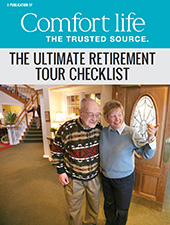Age is More – Challenging Attitudes about Aging
A few weeks ago, I had the pleasure of attending the launch of a new campaign spearheaded by Revera Inc. The campaign focus is on Ageism, which is defined by the Ontario Human Rights Commission as “a socially constructed way of thinking about older persons based on negative attitudes and stereotypes about aging.” Jeffrey Lozon, CEO of Revera. Photo courtesy of Revera
Jeffrey Lozon, CEO of Revera. Photo courtesy of ReveraAccording to Revera, a leading provider of seniors’ accommodation, care and services, ageism is the most widely experienced and most tolerated form of social discrimination in Canada today. This knowledge was gleaned from conducting proprietary research in partnership with the International Federation on Aging to gauge attitudes and preconceptions about aging.
The results show that:
- One in three Canadians admits they have treated someone differently because of their age.
- Nearly two-thirds of seniors 66+ say they have been treated unfairly or differently because of their age.
- Fully half of Canadians admit that ageism is the most tolerated form of prejudice.
The example given by, Jeffrey Lozon, keynote speaker at the launch event, and President and Chief Executive Officer of Revera Inc. is one which resonated with me. “If someone living with cancer is tired they will not say I am having a cancer moment. However, how many times do we hear people say as they forgot the point of their story that they are having a senior’s moment?” This is unacceptable discrimination as it implies that all seniors have memory issues and as we know, this is simply not true.
Transforming Canadians negative attitudes and stereotypes that can prevent older people from living their lives to the fullest is the goal of the Age is More campaign. The campaign will also serve as an opportunity to showcase the contributions and accomplishments of seniors across the country and aims to dispel commonly held myths about aging and older people.
Revera is not only trying to challenge negative perceptions about aging; it is highlighting its employment practices as senior friendly. Jeff stated that he is proud that they have many seniors on their payroll. In fact, Revera employs 21 registered nurses and 26 personal support workers over the age of 70. He cites their great skills and obvious experience as true assets to the organization. He also reinforces that older employees are more naturally aligned with the older clientele and can bring the crucial element of empathy to their work. He urges business to reconsider their hiring practices in order to ensure that there is no discrimination based on age.
During his talk, Jeff noted a few myths that he observed from his experience in the health care system.
Myth #1: Long term care facilities are bad places to live your final days. However, these facilities, like hospitals, provide services for a large population, and they do their jobs very well. There is always room for improvement, however for the most part; these facilities are staffed by competent and caring staff. In addition, this industry is highly regulated and there is no question that regulatory oversight and monitoring is essential to their success.
Myth #2: Home care can totally replace long-term care. While it is true that some seniors prefer to live at home, this option is not always the best one for everyone, especially if they have limited social interactions due to a variety of factors including losing their driver’s license. Older adults need choices and they need to know the benefits about communal living. Jeff cites that “when people move into a Revera facility their physical and emotional health often improves. The critical tool in maintaining mental alertness is social interaction, and of course, communal living offers that in spades!”
Myth #3: Seniors don’t ‘get’ technology. A report on tech savvy seniors commissioned by Revera shows that there is a growing number of seniors that are adopting technology to make their lives safer and more meaningful. In 2000, only 5% of these Canadians 75 and older were online. Today, that number has grown to 27%; with 88% of them going online at least once per day. So in fact seniors represent one of the fasting growing technology adoptees! Retirement homes across Ontario are responding to this need and many of them are ensuring wifi connections and some even provide their clients with laptops.
Myth #4: Government will be able to defray all costs of elder care. This is simply not possible. In 2000, the provincial government spent 46% of all funds on health care and this number is expected to rise to 70% by 2022. How can the province be expected to pay this sum for such a large cohort of people? It will simply not be able to as there will be fewer taxpayers in the next generation.
Jeff went on to say that there needs to be a mix of elder care services, some private and some public. We need to increase our choices when it comes to health care for seniors. Ageism does what any form of discrimination does – it removes choice because it considers that everyone in a particular group, has the same preferences. If we treat every senior the same way and not take into account their cultural beliefs, their attitudes about aging, their health status, their income and their desire for choice, then we are truly doing them a disservice.
It is time to dispel myths surrounding aging. It is time to embrace new possibilities including healthy public policy, age friendly cities, new technologies and intergenerational programs.
For more information on the campaign and to view some inspirational stories about seniors check out www.ageismore.com
By: Malak Sidky, MHSc
* * * * *
Have you or a loved one experienced ageism? Share your thoughts in the Comments section below.
Related:
Boomers Reject Ageist Advertising


